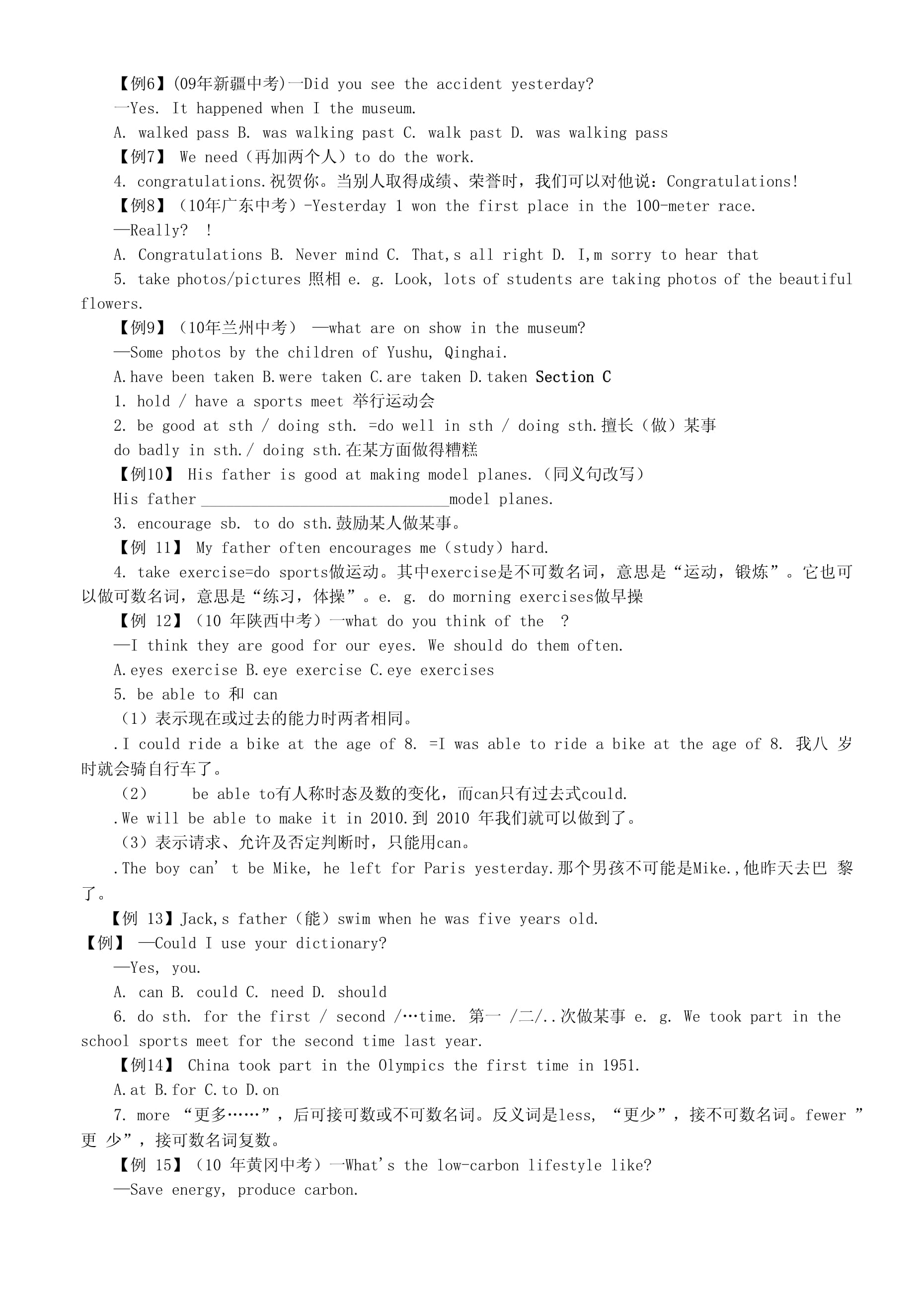




版权说明:本文档由用户提供并上传,收益归属内容提供方,若内容存在侵权,请进行举报或认领
文档简介
八年级(上册)Unit1PlaySports【考点解析】Topic1Areyougoingtoplaybasketball?WearegoingtohaveabasketballgameagainstClassThree.against表示“对着:反对;靠着”cheersb.on为 加油,鼓劲win和beat都可表示“赢”,但用法不同。win(won,won)一般后接比赛,奖品或奖项作宾语,也可作不及物动词,表示“赢”的结果。beat(beat,beaten)击败、战胜,一般接对手作宾语,还可译为“心脏跳动”或“击打”。agame 「ateamwin+事物awar beat+对手anation.,aprize !anapponent(对手)prefer宁愿,更喜欢(1)preferdoingsth.todoingsth.星艮做某事比较起来更喜欢做某事prefersb./sth.tosb./$地.跟某人/某物比较起来更喜欢人/某物(2)prefertodosth.(rather)thandosth.跟做某事比较起来更喜欢做某事(3)prefertodosth.更喜欢做某事join/takepartin(1)join参加某个政党,团体,组织等,成为其中的一员(2)joinsb.(indoingsth.)和某人一起(做某事)(3)joinin=takepartin参加某项活动playforateam为某队效力bein/ontheteam在某队打球dream作名词,“梦,梦想”。e.g.mydreamjob也可作动词dreamof/aboutsth./doingsth.“oneofthe+形容词最高级+名词的复数”意思是“最……之一”。breaktherecord打破记录inthe2008BeijingOlympics在2008年北京奥运会中。“在……比赛中”用herace/inthebasketballgamegiveup放弃。注意应该把介词放在中间。e.g.giveitup,giveupdoingsth放弃做某事。WhataShame=Whatapity真遗憾!SectionCspend/cost/pay/take(1)spend作“花费”之意时,指花费时间/精力/财力在某事或某物上,主语是人。(2)cost主要指花费金钱/时间/劳力/精力等。主语是某物或某事。其结构是sth.costssb….(3)paysb,酬谢某人,pay…for…可等同于spend…on…,或用cost作同义句转换。(4)take一般指花费时间,其主语是名词或动名词,经常用it作形式主语。doexercise=playsports做运动,锻炼Therebe句型的将来时结构为Thereis/aregoingtobe或Therewillbe。注意在Therebe句型中不能出现表示“有”的have和has。thehighjump跳高thelongjump跳远Sure(1)besurethat+从句e.g.Iamsurethatheisright.(2)sb.besuretodosth.某人一定会做某事。强调说话人的语气。(3)besureof/aboutsth./doingsth.“确信”,表示主语对 有把握。(4)用在祈使句里Besure(not)todosth.一定(不)做某事e.g.Besuretocomehereearly.make的用法。(1)makesb.dosth.使某人做某事。被动语态中要还原to。“makesb./sth.+形容词”使某人或某物处于某种状态。(3)makesth.forsb.—makesb.sth.为某人制作 begoodfor“对 有益”,反义词组是bebadfor“对 有害”。keephealthy=keepfit保持健康SectionDplayagainst星艮 进行比赛playwith/playagainst/playforplaywith玩耍,游戏,玩乐,与 玩耍。playagainst同 比赛。playfor为 效力。leave…for…离开某地去某地leavefor=setofffor出发去某地.一般将来时(1)含义:表示将来某个时间要发生的动作或是存在的状态,也表示将来经常或反复发生的动作,常与表示将来的时间状语连用,如:tomorrow,soon,lateron,nexttime(week,month,year,Sunday…)等。(2)结构为begoingtodosth.或willdosth.。Therebe句型的将来时结构为Thereis/aregoingtobe或Therewillbe。注意在Therebe句型中不能出现表示“有”的have/has。(3)表示位置移动的动词go,come,leave,fly,start等可以用现在进行时表示将要发生的事。其中go和come一定要用现在进行时表示将来。【例19】(10年河北中考)Thistermover.Thesummervacationiscomingintwoweeks.A.isB.wasC.hasbeenD.willbe【例20】(10年重庆中考)Ifyoutothe2010ShanghaiExponextweek,Iwillgowithyou.A.goB.hasgoneC.willgoD.aregoing【考点解析】Topic2Wouldyoumindpassingmesomewater?SectionAwould/could/willyou(please)dosth.“请你做 好吗?”表示委婉请求对方做某事,否定结构是would/could/willyou(please)notdosth.°e.g.Wouldyoupleasenotplaythepianoloudly?fallill“生病”,beill“生病的”,强调一种状态。feelill“感觉不舒服”,强调一种身体感受。falldown摔倒,跌倒。mind的用法(1)作动词,表示“介意”,常用于疑问句或否定句中。其结构是mindsb./sth./doingsth.对wouldyoumindsb./sb.'sdoingsth.及“wouldyoumindif+从句”的回答,如果是表达“会介意”,可用Yes,you'dbetternot./IamsorrybutIdo.如果表达“不会介意”,可用No,notatall./Nevermind./Itdoesn'tmatter./No,ofcoursenot.(2)用于提出建议。Wouldyouminddoingsth./wouldyoumindnotdoingsth?对Wouldyouminddoingsth.的回答可以用Ofcoursenot,Iwilldoitrightaway./Sorry.Iwilldoitrightaway.对wouldyoumindnotdoingsth的回答可以用Sorry,Iwon'tdoitagain/I'msorryaboutthat(4)作名词,“思想”。setone'smindtodosth./onsth.专注于做某事beglad/happytodosth.乐意做某事practicesth./doingsth.练习做某事SectionBbealwaysdoingsth.老是 ,含有抱怨的感情色彩。careless形容词,反义词是careful。carelessly副词,反义词是carefully.chance机会haveachancetodosth.有机会做某事getachancetodosth.得到一个机会做某事Whatdoyoumeanbysth./doingsth.?=What,sthemeaningofsth./doingsth.?shoutatsb.朝某人喊叫,含有生气或气愤的感情。shouttosb.朝某人喊叫,只是为了使对方听到,没有感情色彩。fightwithsb.=haveafightwithsb.与某人打架beangrywithsb.意为“生某人的气”,如:【链接】(1)beangryat对某人的言行感到气愤,(2)beangryaboutsth.对某事感到生气,如:doone,sbesttodosth.=trytodosth.尽力做某事saysorry/hello/goodbyetosb.向某人道歉/问候,/道be/feelsorryfor/todo为 而抱歉(难过)keep的用法(1)keepsb.doingsth.使某人一直做某事“keepsb./sth.+宾补+adj.”使某人/某物处于某种状态“keepsb./sth.+宾补+adv.”使某人/某物处于某种状态(4)keepdoingsth.继续不断做某事e.(5)“keep+表语”,表示保持/继续(处于某种状态)e.g.keepfit/healthy(6)赡养e.g.Myfatherkeepsabigfamily.(7)保存,保留e.g.HowlongcanIkeepthebook?turndown调低音量turnup调高音量turnon打开turnoff关上注意代词都要放在中间。【分析比较】turnon"打开(水龙头、电视、收音机、灯、煤气等)" turnoff“关掉(水龙头、电视、收音机、灯、煤气等)"。 turnup”开大,调高"。 turndown“减少,关小”inaminute/rightaway/atonce立刻,马上对sorry的回答可以是That'sOK(allright)./Itdoesn'tmatter./Nevermind./NotatallSectionClovedoing/todosth.喜欢做某事exciting/excitedexciting指使人感到兴奋的事excited是指人对 感到兴奋aswell/too/also/either/so/neither(1)too/aswell表示“也”,一般放在句末,且前用逗号隔开,常用于肯定句。e.g.Tomisastudent;Jackisastudent,too/aswell.(2)also表示“也”,用于肯定句中,放在be动词、助动词、情态动词后实意动词前。(3)在否定句中,都要改为either。(4)so表示“也”时,用在倒装句中,表示肯定,其结构是“so+be动词/助动词/情态动词+主语”。e.g.KatewentshoppingyesterdayTomwentshopping,too/aswell(sodidTom).(5)neither表示“也”时,用在倒装句中,表示否定,其结构是“neither+be动词/助动词/情态动词+主语”。e.g。Katedidn'tgoshoppingyesterday;Tomdidn'tgoshopping,either(NeitherdidTom).sothat引导目的状语从句,含义是“以便,目的是,为了"。从句的谓语动词要用may,can,should,could等情态动词,表示目的状语,相当于inorderthat,可以改成inordertodo句型。e.g.Let'stakethefrontseatssothat/inorderthatwemayseemoreclearly.=Let'stakethefrontseatsinordertoseemoreclearly.6.other/others/another/theother/theothersother作形容词,指“其他的,别的”。e.g.otherstudentsothers(1)别人e.g.Youmustbepolitetoothers.(2)“其他的人或物”,指在一个范围之内,除去一部分后剩余的部分,而不是全部,一般出现短语some…others中。.Therearemanystudentsintheclassroom,somearereading,somearewriting,othersaretalking.another(1)(m者或三者以上)“又一个,再一个“。不确定数量中的另外一个。Jackhasboughtanotherpen.(2)别的,不同的。Idon,tlikethisshirt.Pleaseshowmeanotherone.(3)another+数词+名词一数词+more+名词。“再多一些”,在原来的基础上再加一些。one…theother两者之间一个 另一个 SectionD连接时间的介词用法(1)ago“多久之前”,用过去式。结构是“段时间+ago”e.g.twodaysago(2)“before+点时间”,表示“在几点前”,可用过去时、将来时或一般现在时。e.g.Theywillbeherebefore7:00。(3)“in+段时间”,指“多久之后”,用将来时。e.g.WewillgettoBeijinginthreedays.(4)“after+点时问”,在几点之后,可用过去时,将来时或一般现在时。e.g.Weoftenplayfootballafter5:00intheafternoon."after+段时间”,表示“多久之后”,只能用于过去式。e.g.Hecamebackafterfourdays.instead副词,“代替。而。相反”,单独使用时放句末。insteadofsth./doingsth.取代/而不是……buildsb.up使某人更强壮4.havefundoingsth.做某事很愉快havefun=enjoyoneself=haveagoodtime玩得开心,过得快乐havefunwithab.与某人共度快乐时光Havefun/Enjoyyourself/Haveagoodtime等可以作为对别人出行前得祝福。Topic3Whichsportwillyoutakepartin?SectionAthesportsmeet/meeting运动会theboys,800一meterrace男子800米赛跑thelongjump跳远thehighjump跳高therelayrace接力赛跑It,sthe/one,sfirst/second/…timetodosth.makefriendswithsb.与某人交朋友。注意friends要用复数形式。bereadyforsth为某事而准备。 5.maybe/maybemaybe=perhaps副词,“也许,大概”。e.g.Maybeheisatthebusstationnow.maybe是情态动词may后接动词原形be,SectionB.打电话问对方是某人时,可以问Isthat…(speaking)?回答可以是Yes,who,sthat?/Speaking.问对方是谁时用Whoisthat?告诉对方自己是谁时,应该说Thisis…(speaking)。找人接电话时,应该说Hello,mayIspeaktosb.?回答时如果是本人接的电话,可以直接说speaking。Let,smakeithalfpastsix.让我们定在六点半吧。makeit(1)指约定时间e.g.Let,smakeitat6:30.(2)办成,做到(打算或希望做的事)pass动词,“传递”。passsb.sth.=passsth.tosb.把某物传给某人。e.g.Wouldyoupleasepassmethebook?“经过”。e.g.Shewasthefirstonetopassthefinishingline.passby…“经过(某地)”。past可作副词或介词,“在 旁经过”。e.g.Hehurriedpastmewithoutstoppingtotalkwithme.【例6】(09年新疆中考)一Didyouseetheaccidentyesterday?一Yes.IthappenedwhenIthemuseum.A.walkedpassB.waswalkingpastC.walkpastD.waswalkingpass【例7】Weneed(再加两个人)todothework.congratulations.祝贺你。当别人取得成绩、荣誉时,我们可以对他说:Congratulations!【例8】(10年广东中考)-Yesterday1wonthefirstplaceinthe100-meterrace.—Really?!A.CongratulationsB.NevermindC.That,sallrightD.I,msorrytohearthattakephotos/pictures照相e.g.Look,lotsofstudentsaretakingphotosofthebeautifulflowers.【例9】(10年兰州中考)—whatareonshowinthemuseum?—SomephotosbythechildrenofYushu,Qinghai.A.havebeentakenB.weretakenC.aretakenD.takenSectionChold/haveasportsmeet举行运动会begoodatsth/doingsth.=dowellinsth/doingsth.擅长(做)某事dobadlyinsth./doingsth.在某方面做得糟糕【例10】Hisfatherisgoodatmakingmodelplanes.(同义句改写)Hisfather modelplanes.encouragesb.todosth.鼓励某人做某事。【例11】Myfatheroftenencouragesme(study)hard.takeexercise=dosports做运动。其中exercise是不可数名词,意思是“运动,锻炼”。它也可以做可数名词,意思是“练习,体操”。e.g.domorningexercises做早操【例12】(10年陕西中考)一whatdoyouthinkofthe?—Ithinktheyaregoodforoureyes.Weshoulddothemoften.A.eyesexerciseB.eyeexerciseC.eyeexercisesbeableto和can(1)表示现在或过去的能力时两者相同。.Icouldrideabikeattheageof8.=Iwasabletorideabikeattheageof8.我八岁时就会骑自行车了。beableto有人称时态及数的变化,而can只有过去式could..Wewillbeabletomakeitin2010.到2010年我们就可以做到了。(3)表示请求、允许及否定判断时,只能用can。.Theboycan'tbeMike,heleftforParisyesterday.那个男孩不可能是Mike.,他昨天去巴黎了。【例13】Jack,sfather(能)swimwhenhewasfiveyearsold.【例】—CouldIuseyourdictionary?—Yes,you.A.canB.couldC.needD.shoulddosth.forthefirst/second/…time.第一/二/ 次做某事e.g.Wetookpartintheschoolsportsmeetforthesecondtimelastyear.【例14】ChinatookpartintheOlympicsthefirsttimein1951.A.atB.forC.toD.onmore“更多……”,后可接可数或不可数名词。反义词是less,“更少”,接不可数名词。fewer”更少”,接可数名词复数。【例15】(10年黄冈中考)一What'sthelow-carbonlifestylelike?—Saveenergy,producecarbon.A.more;moreB.less;moreC.less;lessD.more;lessSectionDstandfor代表e.g.RedstandsforgoodluckinChina.【例16】(08年龙岩中考)TheTangcostume代表)Chinesehistoryandfashionculture.atleast=aslittleas至少,反义词是atmost=asmuchas至多。【例17】Thispairofshoescosts至少)200yuan.【例18】(10年成都中考)ThefoodIcookisn'tdelicious,butIcanlookaftermyself.A.atfirstB.atlastC.atleast【习题精练】I.词汇A.根据汉语或首字母提示填写单词。TherforjoiningtheEnglishclubistobeabletopracticemoreEnglish.Themodern(奥运会)startedinAthens.Therearemany(旅游者)visitingBeijingeveryyear.Weshouldimproveour(环境)andkeepitclean.FiveringsareasoftheOlympicGames.B.根据汉语提示及句子意思补全句子。Iwasthewinnerinthe(跳高)intheschoolsportsmeeting.Jack(可能)illnow.Isawhiminthehospitaljustnow.1Wouldyoumindcleaningthefloor?—Iamsorry,Iwilldoit(立刻).Youknowhiswords(代表)。口「idea.Wecanmore(和 交朋友)withforeigners.II.单项选择(10年杭州中考)一Wouldyouliketohavechicken?—No,thanks.It'sdelicious,butI,vehadenough.A.someotherB.somemoreC.anothersome(10年长沙中考)Iamsureyouwillyourclassmatesifyouarekindandfriendlytothem.A.catchupwithB.agreewithC.getonbadlywithD.makefriendswith(10年安徽中考)一ItseemsthatAliceneverwantstodoanythingexceptdrawpictures一Right.That'swhatshelikestodo.A.moreB.lestC.mostD.least(10年十堰中考)一WhereisJeff?一I'mnotsure.Heplayingfootballontheplayground.A.maybeB.maybeC.canbeD.mustbe(10年安徽中考)Bobpromisestothefootballmatchunlesshehastohelphisparentsonthefarm.A.joinB.joininC.takepartto(10年山西中考)一Englishisdifficultforme.HowcanIimproveit?一Don'tloseyourconfidence.Ibelieveyouwillitifyoukeeptrying.A.takeB.workC.pickD.make(09年山西中考)一Isitpolitetospeakandlaughloudly?一No,Idon'tthinkso.A.inpublicB.atleastC.ontime(09年新疆中考)一Didyouwatchthebasketballmatchyesterday?一Yes,Wewereallaboutthematch.A.exciting;excitedB.exciting;excitingC.excited;excitedD.excited;exciting(09年广州中考)Haveyouyournewclassmatesyet?A.hadfriendswithB.madefriendwithC.gotfriendtoD.madefriendswith(09年宁德中考)Icalledyouyesterday,butnobodythephone.A.checkedB.repairedC.answered(09年天门中考)一whydoyoulikethatscarfsomuch?—BecauseIthinkitcanmegoodluck.A.fetchB.bringC.passD.take(09年潍坊中考)LiuQian,asalittleboy,wassohisownmagicworldthatheseldomwentouttoplaywithotherchildren.A.goodatB.madaboutC.popularwithD.afraidof(09年福州中考)一WewillbuildasubwayinFuzhoubefore2014.—Wow,!Willitpassourplace?A.whatanexcitednewsB.howexcitedthenewsisC.whatexcitingnewsD.howexcitingnews(08年南通中考)一Hello!MayIspeaktoMr.Smith?—,please.Heisansweringanothercallrightnow.A.GoonB.ComeonC.KeeponD.Holdon(07年厦门中考)Doctorsoftensuggest,“vegetablesandmeatcanhelpyoukeepfit”.A.More;lessB.Few;muchC.Fewer;moreUnit2KeepingHealthy【考点解析】Topic1You,dbettergotoseeadoctorSectionAwhat'swrongwithsb./sth.=what'sthematterwithsb./sth.haveacold患感冒,have后可是艮表示疾病的词语。用来表示“患 疾病”。e.g.haveaheadache/theflu【例1】Youlooksopaleonyourface,doyou(患感冒)?should/shouldn't情态动词“应该/不应该"e.g.ShouldIdosth.?Yes,youshould./No,youshouldn't./No,youneedn't.【例2】(10年江西中考)一Howwastheyouthclublastnight,Mark?—Itwasgreatfun.Youcome.A.mustB.canC.shouldD.may以下是我们所学过的情态动词:(1)can能/会,can't不能/不允许,过去式could,couldn't。e.g.CanIdosth.?Yes,youcan/No,youcan't.(2)need“需要”,作为情态动词时无人称和时态的变化,多用于疑问句或否定句中。e.g.NeedIdosth.?Yes,youmust/haveto.No,youneedn't/don'thaveto.(3)must必须,mustn't表示“禁止”。e.g.MustIdosth.?Yes,youmust.No,youneedn't/don'thaveto.(4)may“可以/能够”,无否定形式。MayIdosth.?Yes,youmay/can.No,youcan't.【例3】(10年福州中考)—Dad,mustIdomyhomeworknow?—No.Youplaygameswithyourfriendsforalittlewhile.A.wouldB.needn'tC.maytakea(good)rest/havea(good)rest(好好)休息【例4】Afterawholeday'swork,wewantto(休息一下).英语中表示疾病的名词或词组大多可以采取“身体部位名词+ache”或“sore+身体部位名词”来表达。e.g.head—headachestomach—stomachacheback—backachetooth—toothacheear—earacheknee—sorekneethroat—sorethroateye—soreeyefoot—sorefoot【例5】(09年潜江中考)—hehavea.Ican,teatanything.—Maybeyoushouldseeadentist.A.coldB.feverC.headacheD.toothachePlentyof意思是“大量的”,既可修饰可数名词,也可修饰不可数名词。一般用在肯定句中,否定句或疑问句中改为enough或many(much)。e.g.Thereisplentyoftimeleft.Isthereenoughtimeleft?【例6】(10年山西中考)Theyhavetimetodothat,butwedon'thavemoneyforit.A.plentyof;someB.little;fewC.plentyof;enoughD.alotof;lotsof【考点链接】alotof/plentyof/anumberof(1)TherearepeopleintheparkonSundays.(2)Youshoulddrinkwater,andhaveagoodrest.【分析比较】alotof:lotsof表示“大量的,许多”。既可修饰可数名词也可修饰不可数名词。plentyof与alotof同义,既可修饰可数名词也可修饰不可数名词。anumberof表示“许多,大量的",修饰可数名词。故⑴三者都可以用。而⑵填alotof和plentyof都可以。boiledwater开水boilingwater在开的水【例7】—Isthereany(开水)inthepot?—No,thereisn,t.我们所学过的系动词有look,seem,feel,sound,get,be,smell,touch等,他们后面都可以接形容词作表语,构成系表结构。e.g.feelhappy,soundgreat,smellterrible而实意动词后面是用副词去修饰。e.g.singhappily,stepquietly.【例8】(10年漳州中考)一Themeatdelicious.Ican'twaittoeatit.A.smellsB.tastesC.soundshadbetter(not)dosth.最好(不要)做某事【例9】(07年泉州中考)—Myfatherdranktoomuchlastnight,hefeelssicknow.—He'dbettersomuch.It'sbadforhishealth.A.nottodrinkB.drinkingC.notdrinktake(1)“吃/喝”,有时可以用have替换。e.g.takesomefood/takeacupoftea(2)服(药)takesomemedicine“takesth./sb.to+地点”把某物/某人带到某地去,而bring是带到说话的地方来。e.g.I'lltakemydaughtertothezoothisSunday.(4)乘/搭(交通工具)e.g.Youshouldtakeabustothepark.(5)花费(时间,劳力)常用于句型:^takessb.sometimetodosth.e.g.Ittakesusonehourtodoourhomeworkeveryday.(6)买。e.g.Iwilltakeit.(7)“做”,和名词连用,表示与该名词意义相关的动作。e.g.takeawalk/takephotos【例10】(10年鸡西中考)—Howlongdoesittakeyourfathertoworkeveryday.—Abouthalfanhour.A.drivesB.drivingC.todrivefeellikesth./doingsth.=wouldlikesth./todosth.=wantsth./todosth.想要某东西/做某事e.g.Hedidn'tfeellikegoingtoschool.【例11】Katedidn'tfeellike(eat)becausehewasnotwell.dayandnight日日夜夜地e.g.Theyworkdayandnight.toomany“太多”,接可数名词的复数形式。toomuch“太多”,接不可数名词。Muchtoo"太……”,接形容词或副词。【例12](08年青岛中考)Thesedayschildrenatschoolareunderpressurethattheydon,thaveenoughtimetoplayorexercise.A.muchtooB.toomuchC.somanyD.toomany【考点链接]toomuch/muchto/toomany(1)Thereavemistakesinthepassage.(2)Eatingcandyisbadforyourteeth.(3)Theproblemiseasyforthem.[分析比较]toomany“太多”,用于修饰名词复数。(1)题意为“这篇文章里有太多错误"。mistakes是名词复数,故填toomany。toomuch修饰不可数名词。candy在此作不可数名词。故(2)填toomuch。muchtoo"太……”,常用于修饰副词或形容词。(3)题意为“这个问题对于他们来说太简单了”easy是形容词,故填muchtoo。1.hurtvt.使疼痛/损伤e.g.Mikehurthislegbadlywhenhefell.vi.疼痛e.g.Myheadhurtstoday,Iwon,tgotoschool.2.show(1)指“把 给某人看“showsb.sth.=showsth.tosb.e.g.Pleaseshowmeyourphotos.=Pleaseshowyourphotostome.(2)指“说明,表明,证明”e.g.Heshowedthatitwastrue.(3)名词,指“展览会”e.g.acarshow【例13]—Willyoupleaseshowyournewpaintingtome?(同意句转换)—Willyoupleaseyournewpainting?nothingserious”没什么严重的”,注意形容词或不定式修饰不定代词时都要后置。【例14]Thereisintoday'smagazine.A.newsomethingB.nothingnewC.newnothingD.anythingnewcheckover"给 做体检,给 做健康检查”,代词要放在中间。each和every都表示“每一”,后接单数名词。each指两个或两个以上中的“每一个”,可用作形容词或代词。而every是指“三个或三个以上中的每一个”。只用作形容词。不可以说everyof。e.g.Everyboywasthereandeachdidhispart.each(1)可用作形容词,指“各自的,每一的”。e.g.oneachsideofthestreet.(2)用作代词,指“各自,每一”。【例15]Eachofthemhasanewhat.(同意句改写)Theyanewhat.Sb.haveanaccident某人发生了一场事故【例16](09年福州中考)—Excuseme,couldyoutellme?—Sorry,sir.Iwasn,tthereatthattime.A.howdidtheaccidenthappen B.howtheaccidenthappenedC.howdoestheaccidenthappen D.howtheaccidenthappensask(sb.)forsth.“请求、恳求(给予)、征求”,如:Whydon’tyouaskhimforsomeadvice?你为什莫不征求他的意见?Jackisaskingforajob.杰克正在求职。[链接]askfor…leave请假(多长时间),此时,leave在这里是名词,是“假期、休假”的意思。SectionDThanks/Thankyouforsth./doingsth.谢谢你 【例17](08年莆田中考)一Thankyouforthedeliciousfood.—.A.Don,tsaythatB.It,snothingC.I,mgladyouenjoyeditnot…until直至” 才e.g.Shedidn,tstoptalkinguntilourteachercame=Shedidn'tstoptalkingbeforeourteachercame.=Shestoppedtalkingafterourteachercame.【例18](10年漳州中考)一It'sgettinglate,Imustgonow.—It,srainingheavilyoutside.Don,tleaveitstops.A.afterB.whenC.untilworryaboutsth./sb.=beworriedaboutsth./$匕.担心某物或某人I,msorrytohearthatbothyouandyoursisteraresick,both…and 和 都,既……又……。当连接两个主语时,谓语动词用复数。both两者都。allm者或三者以上都。either两者之一。neither两者都不。none三者或三者都不。either…or…或者或者。neither…nor…既不也不°notonly…butalso…不仅而且°e.g.IlikebothEnglishandChinese./Neithermathnormusicinterestsme.其中either…or…,neither…nor…,notonly…butalso…连接主语时谓语遵循就近原则。e.g.NeitherhenorIamastudent.【例19]Mrs.TurnerhasboughtaCDplayerasapresent,buthersonherdaughterlikesit.A.either;orB.notonly;butalsoC.both;andD.neither;nor【例20]Thoughourmathteachersaidthatwasn'tadifficultproblem,ofthestudentsinmyclasscouldworkitout.A.bothB.allC.neitherD.none【习题精练]I.词汇A.根据汉语或首字母提示填写单词。一Ihaveapaininmyteeth,-Youshouldgotoseea(牙医).Hefeels(恶心).Heshouldgotoseeadoctor.Hertemperatureis40.Shehada(高烧).It,snothings.Youwillbebetterafteryouhaveagoodrest.(08年吉林中考)Henry,youdon,tlookwell.What,sthemwithyou?B.根据汉语提示及句子意思补全句子。You(最好)stayathomeandhaveagoodrest.What,swrongwithKate.She(看起来苍白的).Whenyougotoseeadoctor,hewillyou(做检查).(08年宁夏中考)I,m(担忧)herhealth.Shelookspale.Stayinbedanddon,tmoveyourleg太多).II.单项选择(10年上海中考)一CanIwearanyclothesIliketoschool.一No,youcan,t!Youwearauniform.A.mightB.mustC.whomD.which(10年上海中考)Isthisaphotoofyourdaughter?Shelooksinthepinkdress.A.lovelyB.quietlyC.politelyD.happily(10年兰州中考)HowmuchdoestheticketfromShanghaitoBeijing?A.costB.takeC.spendD.pay(10年江西中考)一Doyouknowthewaytothepostoffice?一Yes,followmeandI,llyou.A.callB.pickC.showD.invite(10年上海中考)Wewillhavenowatertodrinkwedon,tprotecttheearth.A.untilB.beforeC.thoughD.if(10年南京中考)一I'mveryworriedabouttomorrow,smathstest.IamafraidIcan,tpassthistime.—!I'msureyou,llmakeit.A.NoproblemB.Don'tworryC.That'srightD.Don'tmentionit(10年三明中考)一whotakeyoutothenewschool,yourdadoryoumom?—.Iwenttherealone.A.EitherB.BothC.Neither(09年漳州中考)TheyellowcoatbeLinda'sbecausenobodylikesyellowexcepther.A.can'tB.canC.mustn'tD.must(09年泉州中考)一whoisplayingthepianointhenextroom?Themusicsobeautiful!—It'smysister,Kate.A.soundsB.hearsC.listens(09年龙岩中考)一CanItakethisseat?—.It'sforourteacher,Mr.Li.A.OfcourseB.You'dbetternotC.Yes,please(09年广东中考)Theoldmanisillandhedoesn'tfeellike.A.toeatsomething B.toeatanythingC.eatingsomething D.eatinganything(09年莆田中考)一HishobbyiswatchingTVplayingthepiano.—It'sreadingbooks.A.either;orB.both;andC.neither;nor(09年新疆中考)一Howthemedicinetastes!—Yes.Butthemedicinewillreallyworksoonafteryoutakeit.A.terribleB.deliciousC.sweetD.nice(09年广州中考)Don'tworry.Allthechildrenbythenurses.A.arewelltakencareofB.takegoodcareofC.aretakengoodcareofD.takegoodcare(08年福州中考)一whatanicemodelship!—Thankyou.Itmethreedaystomake.A.paidB.spentC.tookD.wastedm.(10年福州中考)阅读理解Place:FuzhouTheater Date:7:00P.m.May10thNumber:6ROW9,1stFloorPrice:¥80♦Don'tbringanydangerousthings.♦Ifyouarelate,enterthetheaterquietly.♦Theuseofcamerasandvideosisnotallowed.♦Turnoffyourcellphonesorsetthemtovibrationmode震动模式).♦Pleasecheckyourseatnumberandbeseatedbeforetheplaybegins.♦Pleasecheckthedateandseatnumberwhenyoubuyyourticket.Afterthetickethasbeensold,thereisnorefund.Theplaybeginsat.A.7:00P.m.B.9:00a.m.C.7:00a.m.D.9:00P.m.Yourseatnumberis.A.9;Row6B.6;ROW9C.10;Row6D.7;Row9Ifyouarelatefortheplay,you'dbetter.A.walkaroundB.callupyourfriendsC.makemuchnoiseD.enterthetheaterquietlyYoushouldatthetheater.A.usecamerasandvideosB.sellyourticketC.talkwithyourfriendsloudly D.checkyourseatnumberTheunderlinedword“refund”means.A.入场B.出场C.退票D.签票【考点解析】Topic2Imustaskhimtogiveupsmoking.Iamsorrytohearthat.听到这我感到很难过。这是表示同情的一种说法。当你听到别人不幸的事情时,应说此句用来表示你的同情。【例1】—Jim,I'mafraidIcan'tgotoyourpartytonight.Mygrandmaisill.A.I,msorrytohearthat B.That'sallrightC.Shehastostayinbed D.Don'tworryonTV/thephone“(通过)电视/电话”,或直接译成“在电视上/电话上”。【例2】(10年昆明中考)一I'mgoingtobuysomebooks.Willyoucomewithme?—WhynotshoptheInternet?It,smuchcheaperandmoreconvenient.A.onB.inC.atD.withIsee.我明白了。此句为口语,在这里see指“明白,理解”之意。e.g.Hisyoungerbrotherdidn,tseethemeaningofthestory.stayuplate(doingsth.)熬夜(做某事)【例3】Hisfatheroftenstaysuplate(watch)soccergames.【例4】Don'tverylate.YouhavetogetupearlynextmorningA.stayupB.getupC.cutupD.giveuphaveabadcold=haveaterriblecold患严重感冒【例5】—What,swrongwithyou,youngboy?—I'mfeelingterrible,maybeIhavea.A.badlycoldB.muchcoldC.difficultcoldwithout介词,没有。withoutsth./doingsth.反义词是with【例6】Ican'tpasstheexamyourhelp.A.withB.withoutC.don'thaveD.nothaverelax放松。relaxsb./oneself放松某人(某人自己)。e.g.Listeningtomusiccanrelaxyou.relaxed可用作形容词,“使人感到放松的”。【例7】(10年南充中考)一ourEnglishteacherisalwaysveryandmakesusfeel.A.kind;relaxedB.kind;relaxingC.strict;torelaxgiveup“放弃”,代词放在中间。e.g.giveitupgiveupdoingsth.放弃做某事【例8】Don't.Workhardandyouwillcatchupwithyourclassmates.A.giveupB.putupC.growupD.lookupthrowabout“乱扔”,代词放中间。【例9】Wecan,t(乱扔)litter.Weshouldkeepourschoolclean.litter作动词,意思与throwabout相当。e.g.Don,tlitterthegroundwithpaper.作不可数名词时,指“垃圾,废物”。e.g.Youmustn,tthrowaboutlitter.enough作形容词时修饰名词,置于名词的前后均可。如:Doyouhaveenoughmoney?你有足够的钱吗?【链接】(1)enough作副词时,修饰形容词或副词,应置于所修饰的形容词或副词之后,如:Sheisnotoldenoughtogotoschool.=Sheistooyoungtogotoschool.她太小了,还不能上学。enough作代词,意为“足够的东西”,如:Ihaveenoughtodo.我要做的事够多了。【口诀】enough一词的位置,出“名”在前,幸福”(形”“副”)在后。【例10】(10年南充中考)-Doesthechildneedanyhelp?—No.Sheistodressherself.A.enougholdB.youngenoughC.oldenought's+adj.(for/ofsb.)todosth.(对某人来说)做某事是,用for指做这件事情是怎么样的,e.g.It,sdifficultforhimtogettothebank用of时,前面的形容词是指这个人的性格特征。It'sveryniceofyoutohelpme.【例11】It,sniceAndymewithmyEnglishstudy.A.at;tohelpB.of;tohelpC.with;helpD.of;help【例12】(10年沈阳中考)Mybrotheristwometresinheight,It'sverydifficulttofindclothesbigenoughhim.A.aboutB.atC.withD.forSectionCmay有两种含义,一种表示请求允许,译成“可以”。e.g.MayIcomeinnow?一种表示推测,译成“可能”。e.g.Hemaybeagoodteacher/Shemaygotoworktomorrow表示推测,译成“可能”的还有must/might。must是比较有根据的推测,把握性最强。e.g.Thatmustbehisbike.Hisisblack.might表示推测的把握性比may更弱。e.g.Youmightgetaheadachewhenyouworktoohard.否定句中表示推测只能用can't。e.g.Themanintheroomcan'tbehim.HehasgonetoBeijing.【例13】(10年三明中考)一Whosejacketisthis?—ItbewuLei's.Isawhimwearitjustnow.A.can'tB.mustC.may【例14】(10年河南中考)一It'ssuchalongway!WhatshallIdo?—Youtakemycarifyouwant.A.willB.mustC.mayhuman的复数是humanswork(1)作名词时是不可数名词,“工作”。e.g.Wehavemuchworktodotoday.(2)作动词,“上班,工作”。e.g.Sheoftenworkslate.(3)作动词,表示“取得成效”。Ithinkthethoughtwillworkwell.(4)作动词,表示“运转,工作”。e.g.MyTVsetdoesn'twork.【例15](10年青岛中考)Hemayleavenow,becausethereisworkforhimtodo.A.alittleB.someC.noD.anythrough/across/cross/pastacross的含义与on有关,表示某一动作是在某一物体的平面上进行,其意思是“横过”。e.g.Wewalkacrosstheroad.cross=goacrosscross是动词,而across是介词。through的含义与in有关,表示动作发生在立体空间,是从内部穿过。e.g.Hewalkedthroughtheforest/village.past可作副词或介词,“在旁经过“。e.g.Hehurriedpastmewithoutstoppingtospeak.【考点链接】cross/across/through/past(1)Lookbothwaysbeforeyoutheroad.(2)Hewalkedthefield.(3)Theballwentflyingthewindow.(4)Studysomeexampapertogetanideaofthequestions.【分析比较】 四者都有“经过,通过”的意思,但词性和用法不同。cross意为“横过,穿过,越过,渡过”,为动词,相当于walk(go,run)across,故(1)填cross。across意为“横过,穿过”,为介词,不作动词,不能作谓语,常放在动词之后,如:goacross,walkacross等。故(2)填across。另外,表示游渡,乘船过海或过河时用across。through是介词,含有“从……中间穿越”之意,表示四周含有物体的穿越。故(3)填through。试比较:Theroadrunsacrosstheplain.一条路横过平原。Theriverflowsthroughthecity.这条河从城市穿过。past既可作副词也可作形容词,作副词时有“穿越,经过”之意。如:Willyougopastmyhouseonyourwayhome?你回家的路上会经过我家吗?作形容词时有“以前的,刚过去的”之意,如:Inthepastyear,Shanechangedjobs3times.在过去一年里莎恩换了3次工作。故(4)填past。【例16】(10年连云港中考)LiuXiangcamethirdthe110-meter-hurdleracelastmonthinShanghai.A.inB.fromC.acrossD.through【例17】(10年呼和浩特中考)ThepolicemanhelpedtheoldwomanwalktheroadA.aboveB.acrossC.throughD.overSectionDas(1)用在同级比较中,“像 一样”。e.g.Heisasyoungasme.否定句中前面一个as可以改为so.(2)(表示方式)如同,按照。e.g.DoasItoldyou.⑶当……时候。e.g.Isawhimashewasgettingonthebus.(4)由于,鉴于。e.g.Ashewasnotwell,Idecidedtogowithouthim.(5)作为,当做。e.g.Heworksasasinger.【考点链接】like/as(1)Hehasblueeyesme.(2)Sheenjoysallkindsofmusic,Ido.(3)Repeatthesefivesteps,inthelastexercise.【分析比较】like和as都含有“像……一样”之意,但在用法上有一定的区别。like为介词,置于名词和代词前。(1)中的me是代
温馨提示
- 1. 本站所有资源如无特殊说明,都需要本地电脑安装OFFICE2007和PDF阅读器。图纸软件为CAD,CAXA,PROE,UG,SolidWorks等.压缩文件请下载最新的WinRAR软件解压。
- 2. 本站的文档不包含任何第三方提供的附件图纸等,如果需要附件,请联系上传者。文件的所有权益归上传用户所有。
- 3. 本站RAR压缩包中若带图纸,网页内容里面会有图纸预览,若没有图纸预览就没有图纸。
- 4. 未经权益所有人同意不得将文件中的内容挪作商业或盈利用途。
- 5. 人人文库网仅提供信息存储空间,仅对用户上传内容的表现方式做保护处理,对用户上传分享的文档内容本身不做任何修改或编辑,并不能对任何下载内容负责。
- 6. 下载文件中如有侵权或不适当内容,请与我们联系,我们立即纠正。
- 7. 本站不保证下载资源的准确性、安全性和完整性, 同时也不承担用户因使用这些下载资源对自己和他人造成任何形式的伤害或损失。
最新文档
- 2025至2030年织带十字编鞋材项目投资价值分析报告
- 2025至2030年碳钢拉簧项目投资价值分析报告
- 金融安全及主题教育活动
- 三年级数学上册第六单元数学广场流程图教案沪教版五四制
- 脑桥出血护理查房
- 2025至2030年左氟沙星项目投资价值分析报告
- 2025至2030年塑胶电子遥控器项目投资价值分析报告
- 2025至2030年四座小狗转椅行业深度研究报告
- 2025至2030年全球及中国橡胶地板垫行业市场分析及投资建议报告
- 2025至2030年中国藏红花行业市场研究分析及投资前景评估报告
- 新编煤矿员工不安全行为及岗位规范管理手册汇编(版)
- 07J902-3 医疗建筑(卫生间、淋浴间、洗池)
- 推荐如果历史是一群喵读书分享会模板
- 急诊绿色通道管理考试及参考答案
- 中国农业银行笔试题库(含答案)
- 【课件】高考英语试卷讲评之七选五课件
- 地下室抗浮锚杆施工方案
- 全套可编辑地图
- JJF 1485-2014圆度定标块校准规范
- GB/T 4802.2-2008纺织品织物起毛起球性能的测定第2部分:改型马丁代尔法
- GB 4053.2-2009固定式钢梯及平台安全要求第2部分:钢斜梯

评论
0/150
提交评论